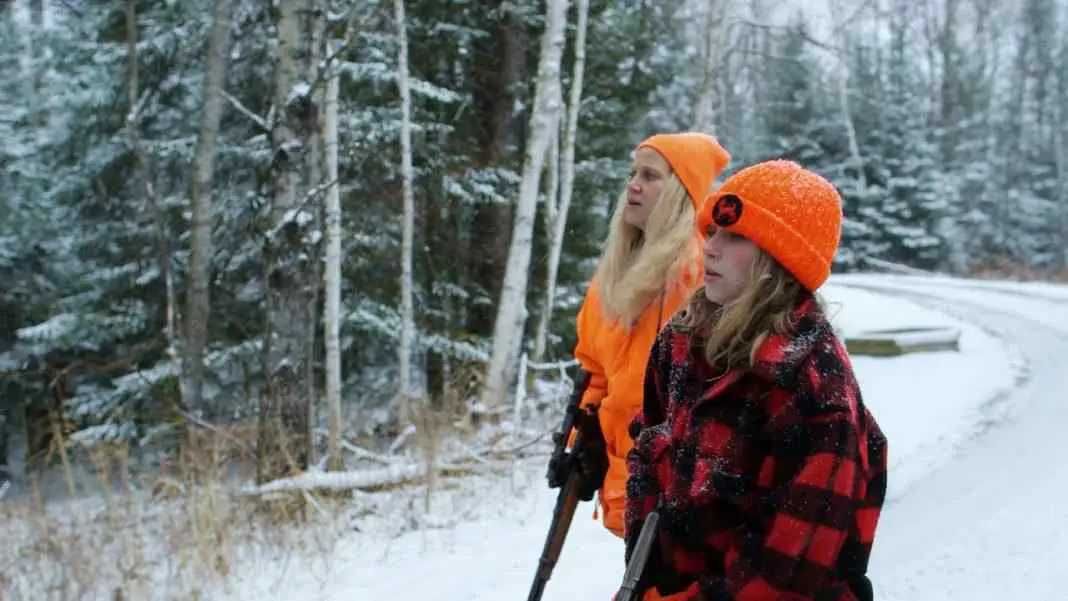Since this is Wicked Horror, let me start by saying that Cold November isn’t a horror movie. There’s a dream of a dead cousin that’s debatably a ghostly visit in the first third of the movie and two graphic scenes of deer gutting, but none of it is played for scares. Rather, Cold November is a tender coming of age story, following Florence (Bijou Abas) on her first family hunting trip. That said: It’s quite good.
What first-time director and writer Karl Jacob does best is capture the awkwardness of adolescence. Florence doesn’t know whether she’s an adult or a child. The adults in her family don’t either. She swears in front of her mother for the first time, and the moment feels so true-to-life. Her mother Amanda (Anna Klemp) replies, “I’ve never heard you say, ‘Shit,’ before.” It’s awkward, and Klemp’s performance underlines that she doesn’t know if she should punish Florence. Amanda settles for warning Florence not to do it in front of her grandmother, Georgia (Mary Kay Fortier-Spalding). It’s one of the more subtle indications that Florence is entering into adulthood.
Jacob really does hammer home Florence’s maturing. In addition to the swearing scene, he underscores her transformation with maybe too many different symbolic moments. Florence throws a Matchbox car she brought out of her tree stand as she waits, symbolically throwing away her childhood. She has her first period, symbolically entering womanhood. When the family sits in the sauna, the adult women wear black bathing suits representing their maturity while Florence wears a white and black bathing suit, representing her liminal status. What saves it from being an over-the-top self-parody is that true-to-life dialogue. The characters sound and act like real people, which waters down the symbolism, making it feel less obtrusive.
The realism in the characters pays off even more as Cold November hits its political beats. There probably aren’t any readers who are unaware of America’s raging gun-control debate. It would’ve been really easy to fall into the trap bad dialectic stories fall into with ludicrous Strawman representations of one side of the argument. Instead, Georgia tells her granddaughter about what it was like when there was no work, and how when she was growing up her family lived on the deer they killed. She ends saying, “You never know when you’ll have to live off the land.” It’s a reminder that for some, guns are a tool necessary to survive that artfully never mentions guns. The movie counters it though, with the offscreen death of Florence’s cousin Sweeney (Alaina Lucy Rivera). No one ever comes out and says what happened, but it’s heavily implied that Sweeney committed suicide with a firearm. It’s something that the national discussion, which centers mass shootings tends to gloss over, but according to the CDC 6.9 out of every 100,000 Americans committed suicide with firearms in 2017, more than half of all total suicides in the U.S. last year. Cold November never offers an articulate view, leaving audience members to make their own conclusions.
Jacob does great work in the same vein in his portrayal of womanhood. At no point do any of the women in this matriarchal tribe talk about the importance of womanhood. Yet, with four of the five principal characters being women, it’s front and center. Jacob avoids the more elementary issues that the Internet has been (rightly) criticizing male writers for getting wrong about women. As a male, I don’t have the authority to grade Jacob on how well he portrayed the interior lives of these women, but I can say that they are fleshed out characters. They’re three-dimensional, never reduced to megaphones for Jacob’s views on gender. They’re good, able hunters because they’ve been doing it for years, regardless of their gender.
The one place where Jacob misses is the ending. With a majority cast of women, Uncle Craig, played by Jacob himself, delivers an impactful, emotional speech that welcomes Florence into adulthood. I can’t know what went through Jacob’s mind when he made the decision to end with Craig’s speech. With the emphasis Jacob put on symbolic acts through the film, it seems like he must’ve been aware that whatever is said in the emotional climax of the film would have the most weight. Giving those lines to the only male character seems to imply that his point of view, his thoughts, are more important than those of the women in the family. In a more mixed cast, it would be less noticeable. But in the film, there is one man with more than a minute or two of screen time, and his thoughts are given more weight than the rest of his all-female family because of when they come.
There are other reasons that Jacob could’ve made that choice. He could’ve thought that he was the best actor to deliver that speech and wanted to end with the best performer. He could’ve wanted to have Craig deliver the speech since Sweeney was his daughter. No matter what the reason, it feels like a big misstep in an otherwise strong film.
Much like Greta Gerwig’s 2017 Best Picture Nominee Lady Bird, Cold November tells the story of a young woman struggling into adulthood and searching for her place within her family. It won’t scare anyone, and it’s not supposed to. It’s an impressive second effort from Jacob, a meditation on grief, on coming of age, and on family. The film is available on iTunes and Vimeo on Demand beginning May 22nd.
WICKED RATING: 7/10
Director(s): Karl Jacob
Writer(s): Karl Jacob
Stars: Bijou Abas, Karl Jacob, Anna Klemp
Release date: May 22nd, 2018
Studio/ Production Co: Kjax, Mama Bear Studios
Language: English
Length: 92 minutes
Genre: Drama
Subgenre: Coming of Age
